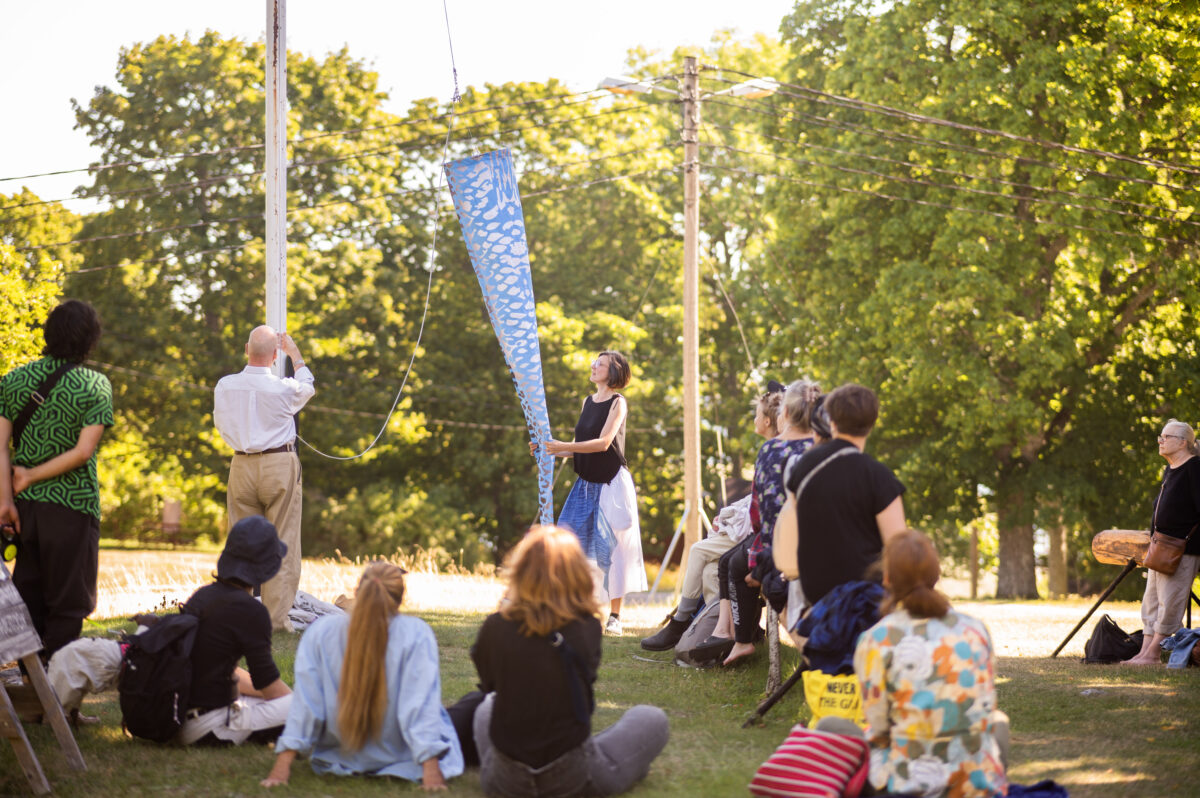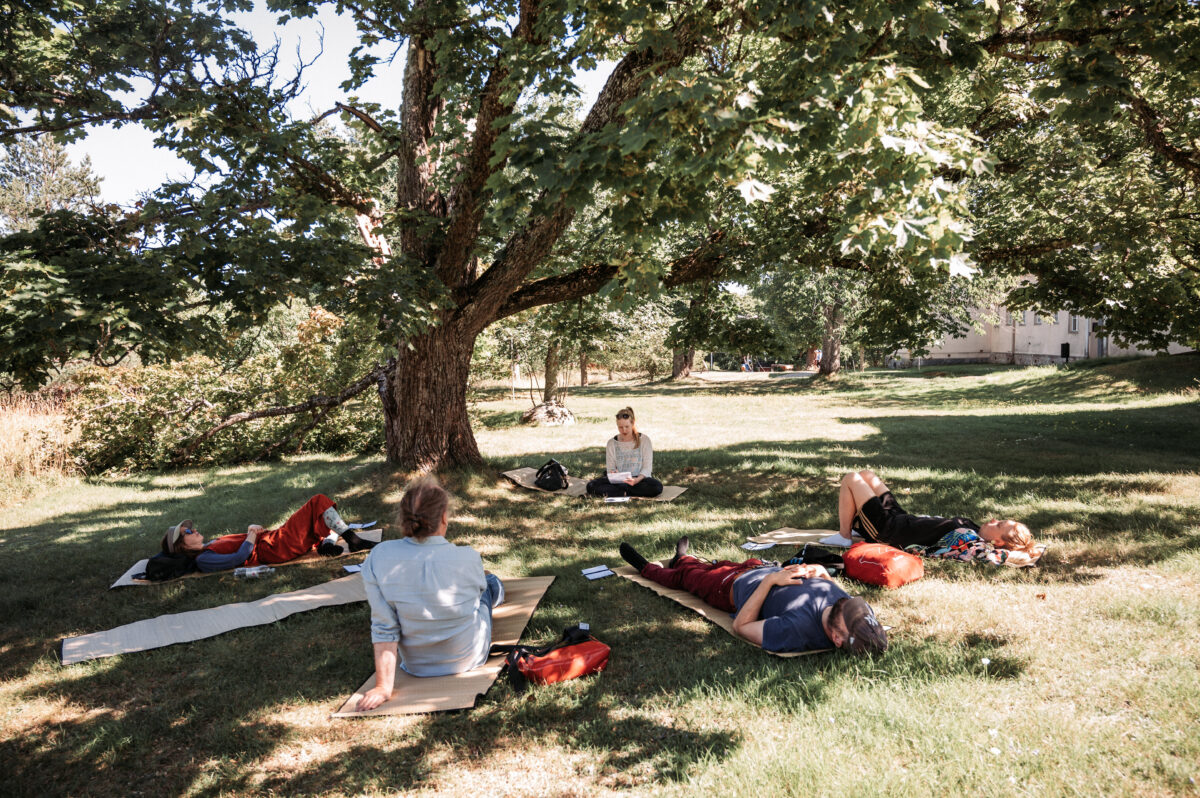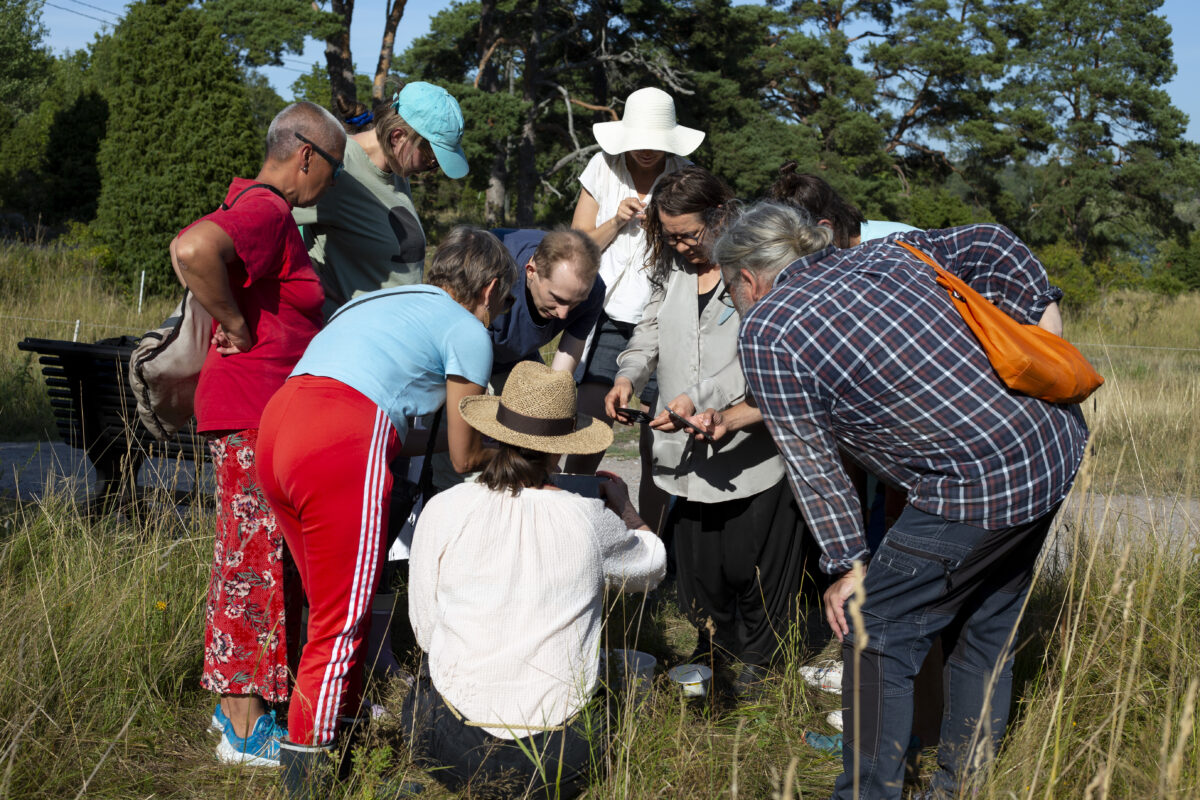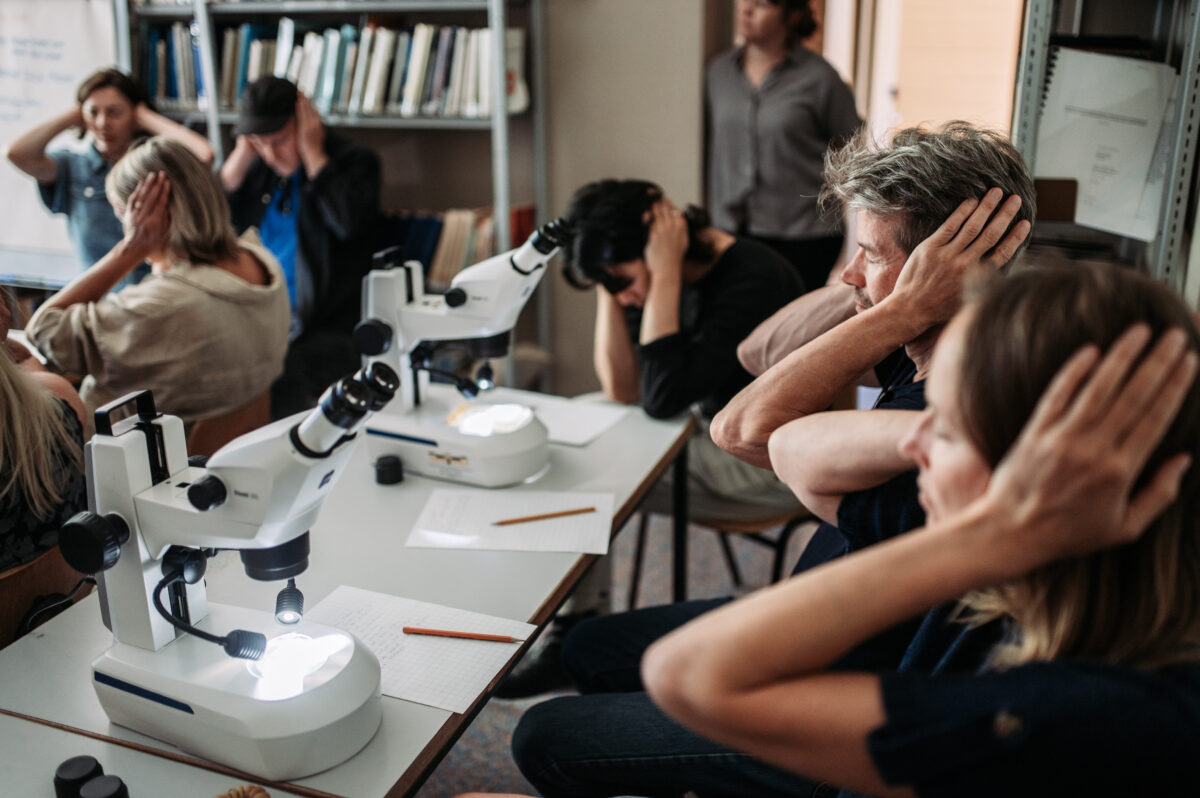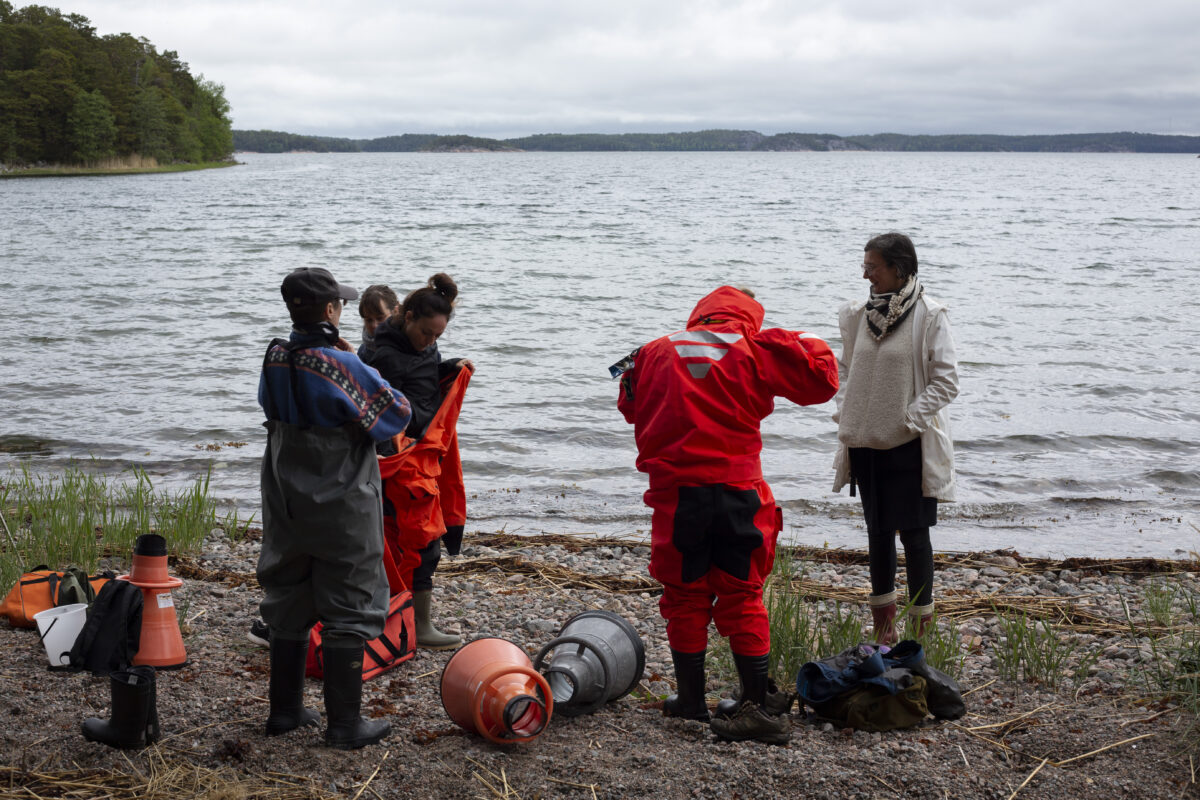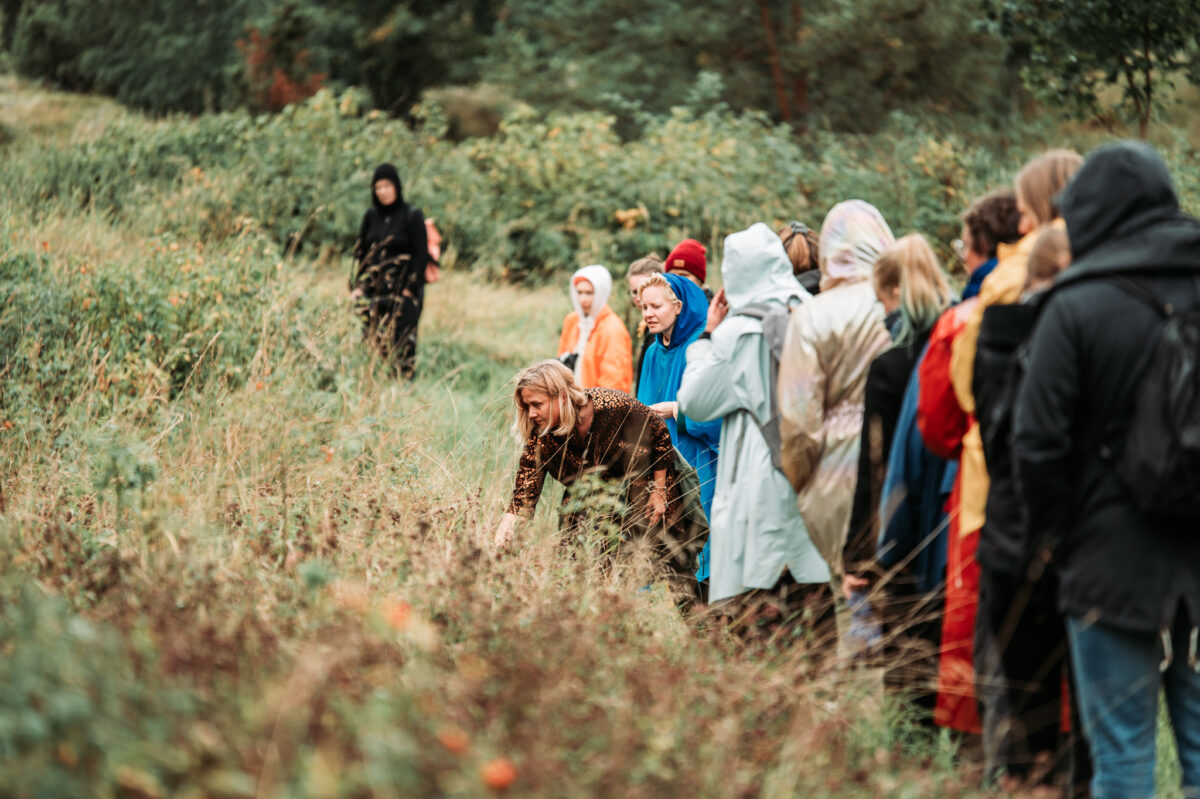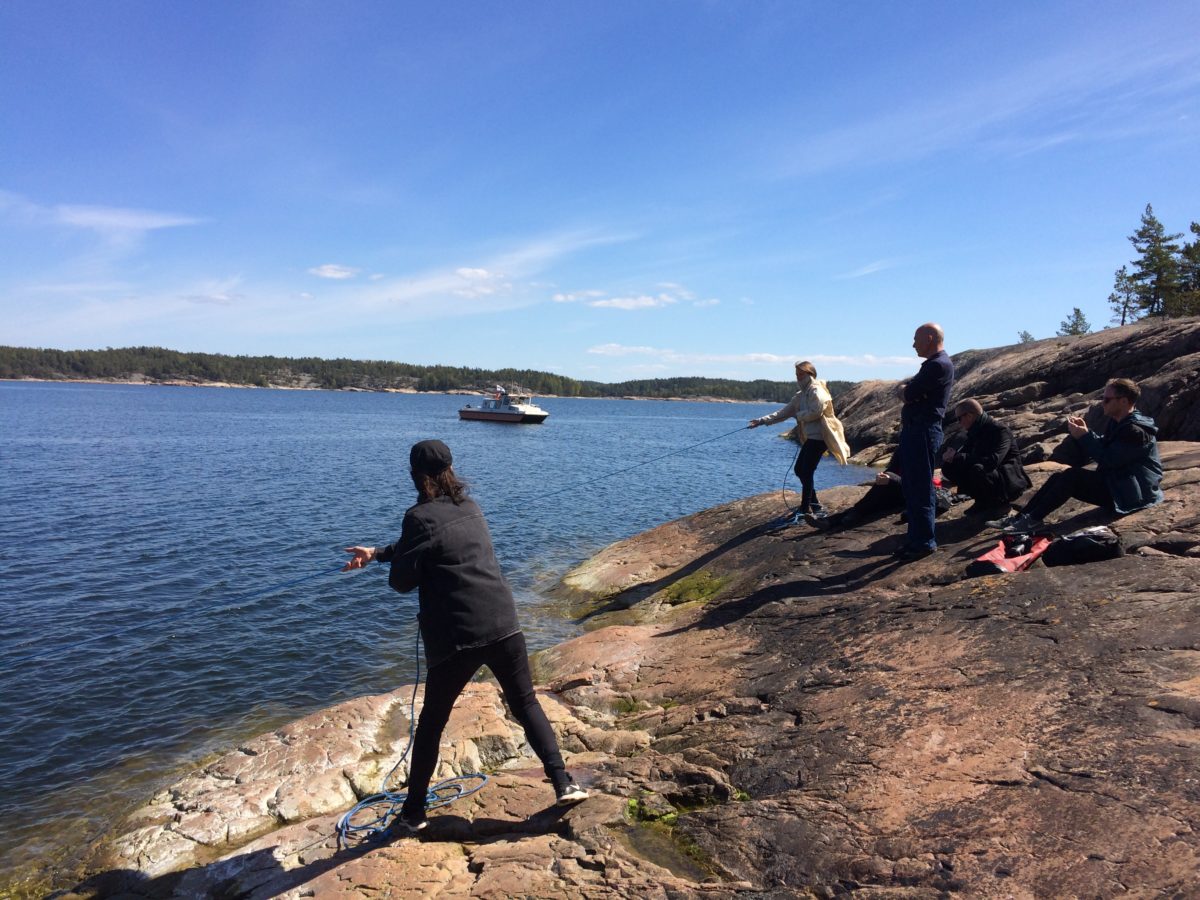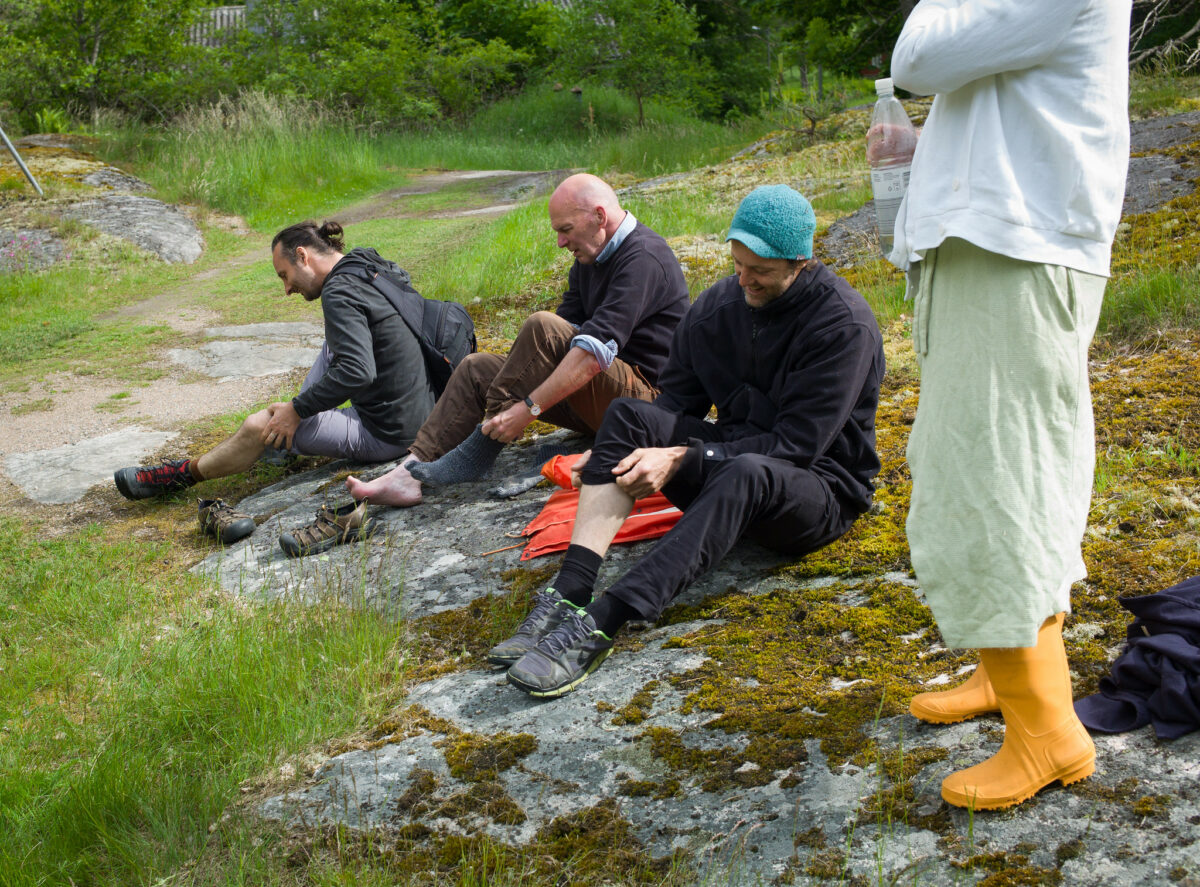Statement in support of the Archipelago Research Institute
Ecological emergency calls for fundamental societal and cultural transformations, which require increasingly transdisciplinary research as well as dialogue between the arts and the sciences. The Archipelago Research Institute of Turku University, located on the island of Seili, has been an exceptional resource and platform for this urgently needed multidisciplinary work.
In the collaboration between CAA and the Institute, ongoing since 2016, fieldwork has been central in the development of dialogue between artistic and scientific research practices. Meeting in the field, around the shared matters of concern and embedded within the environment in question, the differences between disciplines have no longer appeared as obstacles. Rather the differing approaches have opened up a richer set of questions and a prism of perspectives on the studied environmental phenomena.
The long-term continuity of scientific fieldwork in Seili and the unique collection of data on the changes affecting the surrounding marine ecosystem, alongside the dense history of institutions of care and control on the island, have together formed a singular framework with which to critically reflect on the complex entanglements of local and global socio-ecological phenomena.
The numerous artworks, events and articles produced by the artists and researchers, who have participated in CAA’s project Spectres in Change (2017-2023) with the Archipelago Research Institute, would not have been possible without the time spent in the field with the scientists in Seili. The depth of situated knowledge shared by the scientists and, importantly, their boundless generosity and openness to multidisciplinary dialogue, has been foundational for the development of not only new understandings but also emergent methods and initiatives for future collaboration.
The current project, which is soon coming to a close, has focused on nurturing enquiries and exchange between disciplines, with time and attentive care. Yet both the longterm and novel research on environmental changes in the Archipelago Sea have also been shared in multiple public events, workshops and lectures, exhibitions and performances, and diverse publications to a range of audiences regionally and internationally.
The Archipelago Research Institute has during these years also hosted other multidisciplinary research projects by diverse actors and has actively woven connections and fostered collaborations between them. Guided by a commitment to research as a common good rather than competition, as well as to furthering understanding of the escalating ecological urgencies, the Institute has welcomed with enthusiasm all the weird questions and experimentations that multidisciplinary work and, moreover, societal change require.
The future of the Institute, the continuation of its decades-long time series of data and the collaborations it fosters, face now an uncertain future due to the severe funding cuts planned by the University of Turku. This is surely not a time to cut from research and education, but rather to increase support for both the continuity of environmental research and for the development of multidisciplinary work towards a sustainable, liveable future along these shores and beyond.
CAA Contemporary Art Archipelago:
Taru Elfving
Curator, researcher, Phd, co-founder of CAA, Helsinki FI
Lotta Petronella
Filmmaker, artist, co-founder of CAA, Turku FI
Selina Oakes
Artist, Helsinki FI
Artists and researchers working with CAA and the Archipelago Research Institute in Seili:
Lise Autogena
Head of the Art, Design and Media Research Centre, Sheffield Hallam University UK
Luis Berríos-Negrón
Artist, PhD, Research fellow, Umeå School of Architecture SE
Andrew Best-Dunkley
Professor of Sculpture, University of the Arts, Helsinki FI
Jonatan Habib Engqvist
Author, curator, PhD, Stockholm SE
Saara Ekström
Artist, Turku FI
Francisco Gallardo (FRAUD)
Artist, Phd, University of Loughborough UK
Nik Gaffney (FoAM Earth)
Artist, Brussels BE
Ros Gray
PhD, Programme Leader, MA Art & Ecology, Goldsmiths University of London UK
Antye Greie
Artist, musician, Hailuoto FI
Liinu Grönlund
Artist, filmmaker, Helsinki FI
Lilli Haapala
Artist, Turku FI
Ayesha Hameed
Artist, PhD, Co-programme Leader, Visual Cultures, Goldsmiths University of London UK
Kalle Hamm
Artist, Helsinki FI
Helena Hunter (Matterlurgy)
Artist, researcher, London UK
Hanna Husberg
Artist, PhD, Assistant Professor at Research Center, Stockholm University of the Arts SE
Mari Keski-Korsu
Artist, Doctoral researcher, Aalto University FI
Anastasia (A) Khodyreva
Researcher, Turku FI
Kristiina Koskentola
Artist, PhD, Amsterdam NL
Maja Kuzmanovic (FoAM Earth)
Artist, Brussels BE
Maria Kamilla Larsen
Curator, Copenhagen DK
Michy Marxuach
Curator, San Juan PR
Agata Marzecova
Environmental scientist, PhD, Tallinn EE
Okku Nuutilainen
Artist, filmmaker, Helsinki FI
Merja Puustinen
Visual artist, researcher, Helsinki FI
Anna-Kaisa Rastenberger
Museum Director, Professor, PhD, Helsinki FI
Arja Renell
Artist, architect, Helsinki FI
Kati Roover
Artist, Helsinki FI
Audrey Samson (FRAUD)
Artist, PhD, Senior lecturer, Goldsmiths University of London UK
Maija Savolainen
Artist, Lecturer in Photography, Aalto University FI
Ulla Taipale
Curator, INAR, Helsinki University FI
Mark Peter Wright (Matterlurgy)
Artist, PhD, Programme Leader, University of the Arts, London UK
Giovanna Esposito Yussif
Curator, Helsinki FI
(EN)
Individual statements in support of the Archipelago Research Institute
The Archipelago Research Institute on Seili is a unique and exemplary site for climate research and art-science collaborations of international significance. Given the now widespread recognition of the vital importance of interdisciplinary work in addressing the climate crisis it is devastating to hear that it is under threat.
Dr. Ros Gray
Programme Leader, MA Art and Ecology, Goldsmiths University of London UK
/
The Archipelago Research Institute on Seili is an important node in the international art-science collaborations, and has a reputation of facilitating long-term projects that are needed to work together towards meaningful change. The research and the location of the institute, as well as the expertise and openness of the researchers have been invaluable for many scientists and artists over the years. The research and collaborations that happen on Seili are uniquely site-sensitive and would suffer from closing the research station on the island. Also, the research institute seems like a last bastion preventing the island from being overrun by unsustainable tourism. In this day and age of intensifying climate chaos, we believe that the closure of the research station would impoverish not only the the island, but also the community of people working to strengthen environmental art-science collaborations in Finland and abroad. Furthermore, the continuation of decades long time series is of great scientific and transdisciplinary importance.
Maja Kuzmanovic & Nik Gaffney (FoAM Earth)
Artists, researchers, Brussels BE
/
The knowledge and research on Seili is situated knowledge. The site-sensitive data and time series that have been collected here since the 1960’s contains vital information on the effects of climate change in th Archipelago Sea.
Knowing the history of the island as a detention centre and a prison for those not seen to fit the societal norms of the times there is an uncanny haunting taking place. The ghost being the institutional structures present on the island rather than the individuals sent there.
The planned cuts by Turku University are handled behind closed doors with an air of mystery. The story unfolds online and through the newspapers. Where is the dignity of facing the people who have worked and lived here for years? In the past people were forcefully brought to the island. Now they are forced to leave.
Lotta Petronella
Artist, filmmaker, CAA Contemporary Art Archipelago, Turku FI
/
It is devastating to hear of the proposed closure of the Archipelago Research Institute in Seili, particularly at a time when institutions and governments should be investing more finances and support into monitoring and understanding the multifaceted, socio-ecological realities of the climate crisis. While my own personal and professional relationship with the Archipelago Research Institute in Seili is relatively recent, I perceive it as an integral part of the Baltic Sea’s contemporary fabric. As a site which has conducted ongoing research in the Turku archipelago since 1964, it has, and continues to produce, critical datasets which monitor the changes occurring in the Baltic Sea over a continuum of time: this multigenerational data is key to understanding the increasing effects of human activities on the environment and to proposing solutions for the days ahead.
As a learning-environment, the Archipelago Research Institute in Seili provides an opportunity for multi-disciplinary researchers to engage with the everyday realities of the environment that they are studying: how can one know and care for the changing habits of the herring nor the nuances in its scales without softly wading into its habitat? As an artist curator working with CAA and the Archipelago Research Institute in Seili, I have been able to observe and participate in a community which opens up the puzzle of scientific research beyond the confines of the classroom and encourages a deeply embodied connection with the ecosystems that we, humans, depend upon to live, to breathe.
Selina Oakes
Artist, curator, Helsinki FI
/
It is with great shock and sadness that we hear of the threatened closure of the University of Turku’s Seili Archipelago Research Institute. The long-term scientific data collection and research carried out by the experts at the institute are of crucial importance for understanding the consequences of climate change and its affects on marine species – and by extension – the wider environment, including human society.
This basic, hands-on research work is essential for true understanding of the world and ecosystems but also essentially important for ecological protection of threatened marine environments in the Baltic Sea. Finland has made international commitments to do its own share in protection of the ecosystems of the Baltic Sea, Finnish archipelago and coastline (HELCOM). Mere remote data collection is not enough. The urgency of the protection enabled by the scientific research in marine research units and pedagogical programmes are vital and imperative in protecting the environment against further decline. It would be extremely short-sighted to abandon decades of carefully constructed research at this time of ecological crisis.
Andy Best
Professor of Sculpture, Academy of Fine Arts, University of the Arts Helsinki FI
Merja Puustinen
Visual artist & researcher, Helsinki FI
Imagining Godzilla art-science research project, Baltic Sea 2019 – 24
/
Seili is a unique ecological and cultural site which will only be more relevant and important as the climate change progresses. Losing long running institution with all the infrastructure, knowledge pool and data histories in this unique site is very short-term thinking. It is quite possible that future generation of scientists and ecologists as well as cultural workers will deeply regret this unfortunate decision to willingly loose common access to the place.
Dr. Agata Marzecova
Environmental scientist, Tallinn EE
/
On behalf of the international hydrofeminist community, I would like to express deep concern about the status and survival of the Seili research station. As a member of the diverse multi-national movement of scholars, artists, writers, and activists who focus on creating more liveable futures, I find Seili to be an ultimately unique transdisciplinary harbour. An intention to do meaningful transdisciplinary work, which the present socio-environmental condition urgently demands, can only be realised with a safe harbour that provides, hosts and cross-pollinates a multiplicity of expert opinions and multigenerational knowledge. Scholarly results speculated outside of a field can hardly be converted and nuanced into protocols and practices the planetary condition demands. The Seili station offers such a field and, moreover, welcomes one into a sustainable and open community that has been gradually and persistently growing for several decades and that cannot be reproduced elsewhere and a brief period of time. The hydrofeminist community remains hopeful that the Seili research station will continue its operation.
Anastasia (A) Khodyreva
Researcher, Turku FI
/
(FI)
Lausuntoja Saaristomeren tutkimuslaitoksen puolesta
Olen seurannut Seilin saarella ja Saaristomeren tutkimuslaitoksella tehtävää monialaista tutkimusta ja tutustunut siellä työskennelleiden tieteilijöiden ja myöhemmin myös taiteilijoiden työhön noin 15 vuoden ajan, jolloin olen käynyt saarella säännöllisesti. Seili on saaristossa, Itämerellä ja Saaristomerellä, sitä ympäröi ja siellä on se luonto, mitä siellä tutkitaan.
On mahdotonta uskoa, että vuosikausien kärsivällisyyttä ja pitkäjänteisyyttä vaativa työ ollaan heittämässä hukkaan. Varsinkin, koska meren ja saaristoluonnon tutkimus ei ole käynyt tarpeettomaksi ja sitä tarvitaan enemmän kuin koskaan päätöksenteon ja luonnossa tapahtuvien muutosten ymmärtämiseksi ja tulevaisuuden tapahtumien ennakoimiseksi.
Saaristomeren tutkimuslaitos on yksi Suomessa toimivia tutkimukselle erityisen tärkeitä kenttäasemia, joilla myös opiskelijat ovat saaneet harjoitella ja syventää oppimistaan. Vuosien ajan myös taiteilijoiden dialogi paikan ja sen tutkimuksen kanssa on saattanut Seilinkin tutkimusta julkisuuteen ja tätä voimavaraa Turun yliopiston ei tulisi aliarvioida yhtenä yhteiskunnallista vaikuttavuutta lisäävänä strategianaan. Turismille löytynee muitakin paikkoja, joiden luonto ja tunnelma eivät ole yhtä herkkiä massiivisille pikavierailuille, niin kutsutulle risteilyturismille.
Turun yliopisto varmasti löytää keinoja rahoittaa tutkimusta vastaisuudessakin, jos tahtoa sille löytyy.
Ulla Taipale
Kuraattori, Ilmakehätieteiden keskus (INAR) , Helsingin yliopisto FI
/
Seilin tutkimuslaitos on tehnyt merkittävää Saaristomeren tilan pitkäaikaisseurantaa, josta on ollut hyötyä mm. ilmastonmuutoksen tutkimuksessa. Tutkimuslaitoksen toiminta on myös mahdollistanut koko ekosysteemien tarkkailun ja seuraamisen koko saarella. Sen seurauksena on huomattu että esimerkiksi nukula on hävinnyt saarelta. Samoin hullukaali tunnistettiin myrkylliseksi ennen kuin kukaan ehti syödä sitä. Kiitos tästä kuuluu saarella työskenteleville tarkkasilmäisille biologeille. Seilissä kasvaa myös peltomaitikkaa, mikä on käytännössä sen ainoa laajempi kasvukeskittymä Suomessa. Saaren lisääntynyt turistimäärä on uhka koko saarelle, koska sen herkkä luonto ei kestä näin suuria kävijämääriä ja siitä aiheutuvaa kulutusta. Saarella ei ole pelkästään luonnonsuojelualueita, vaan siellä on myös muinaismuistoalueita. Tämä tarkoittaa, että saaren alueita on suojeltu moninkertaisilla säädöksillä. Turistit eivät välttämättä ole tietoisia aina mikä on sallittua ja mikä ei, mikä suojeltua ja mikä ei. Tutkimuslaitoksen yksi tärkeä rooli on myös tiedottaa ja informoida kävijöitä saaren luonnosta ja sen tilasta. Tässä kohtaa myös yhteistyö esimerkiksi taitelijoiden kanssa tulee merkitykselliseksi: Taiteilijat voivat teoksillaan ja omalla työskentelyllään välittää laajemmalle yleisölle tietoa saaren erityislaatuisuudesta.
Kalle Hamm
Taiteilija, Helsinki FI
/
Tutkimusasema Seilin saarella on toiminut tärkeänä tieteen ja taiteen yhteistyön mahdollistajana. Se on ollut todella hedelmällinen paikka monille uusille ideoille mutta myös tärkeä pitkäjänteisen meren- ja ilmastotutkimuksen kannalta. Itselleni on ollut todella tärkeää päästä työskentelemään Seilin saareen, niin CAA:n kuin itsenäisten yhteistyökuvioiden myötä. Se on kuulunut myös tulevaisuuden suunnitelmiini ainutlaatuisuutensa vuoksi. Se on todella tärkeä ja ainutlaatuinen paikka tutkimuksen, taiteen, historiansa ja tulevaisuuden kannalta.
Lilli Haapala
Taiteilija, Turku FI
/
Seilin tutkimuslaitos tekee merkittävää tutkimusta ja Saaristomeren tilan pitkäaikaisseurantaa, ja se on ainutlaatuinen ja esimerkillinen paikka ilmastotutkimukselle ja kansainvälisesti merkittävälle taide- ja tiedeyhteistyölle. Monialainen tutkimus on kansainväliseen tunnustuksen saanutta työtä ja elintärkeä toimija ilmastokriisin tutkimiseen ja ratkaisemiseen. Seilissä tapahtuvan pitkäjänteisen tieteellisen ja taiteellisen tutkimuksen ja pohdinnan lopettamisen mahdollinen lakkauttaminen on järkyttävää. Esimerkiksi Seilin uniikki ekosysteemi ja silakoissa tapahtuvat muutokset ovat osa elintärkeää saarella tapahtuvaa tutkimusta ilmastokriisiin vaikuttamisen ja tulevien sukupolvien kannalta.
Dr. Kristiina Koskentola
Kuvatailija, Amsterdam NL
/
Seilin Saaristomeren tutkimuslaitoksella tehdyllä tieteellisellä tutkimuksella on pitkät ja merkittävät perinteet. Oman kokemukseni mukaan Seilissä työskenteleviltä tutkijoilta löytyy myös poikkeuksellista kiinnostusta avata tiedeyhteisön ulkopuolisille saarella tehtävän tutkimuksen fokusta ja sisältöjä. Tämän kaltaiset kohtaamiset edistävät tieteen ja taiteen välistä kommunikointia, jonka avulla voimme monipuolisemmin hahmottaa, ymmärtää ja käsitellä ympärillämme tapahtuvia suuria muutoksia. Dialogin kautta avautuu myös mahdollisuuksia toimintaan, joka on hyvinvointimme kannalta ensisijaisen tärkeää. Contemporary Art Archipelagon kutsumana seurasin harvinaisiksi käyvien laidunmaiden biodiversiteetin palauttamiseen liittyvää lampaiden laiduntamista Seilin niityillä. Jollain, näinkin yksinkertaiselta tuntuvalla teolla on merkittävä toivoa antava vaikutus – projekti ei hyödyttänyt pelkästään niittyjä, hyönteisiä ja vapaana liikkuvia lampaita, vaan myös meitä, todistaessaan kaikessa vaatimattomuudessaan, että näinkin voimme etsiä ja löytää ratkaisuja ilmaston lämpenemisen ja lajikadon hillitsemiseen. Seilin kaltaiset paikat ovat meriemme majakoita, joissa tapahtuvaa tärkeää tutkimusta ja toimintaa tulee tukea ja edelleen kehittää.
Saara Ekström
Taiteilija, Turku FI
